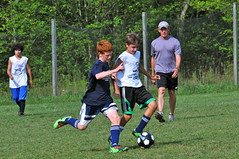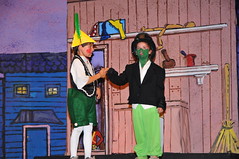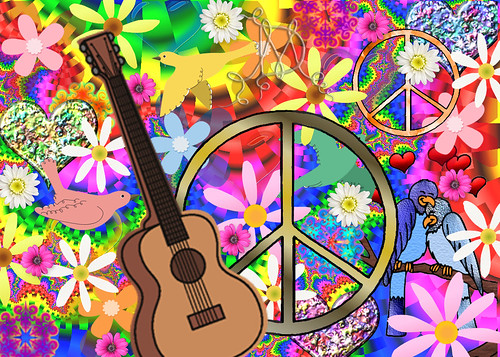 When I think about “camp songs,” I immediately think about singing around campfires, but each year at camp also has a distinct popular music soundtrack. Recently, campers weighed in on Twitter about the tunes that remind them of past summers and that got me thinking about what the United States and camp was like in the 1960s and 1970s.
When I think about “camp songs,” I immediately think about singing around campfires, but each year at camp also has a distinct popular music soundtrack. Recently, campers weighed in on Twitter about the tunes that remind them of past summers and that got me thinking about what the United States and camp was like in the 1960s and 1970s.
Hadley Hury remembers You’re A Good Man Charlie Brown (1969) and Music Man and the Counselors’ Show from 1970. That’s also when Charlie Ziff was theater director, Hadley was assistant director and Jay Newman had the job of radio director for The Fantastiks. 1969 was the year that campers watched the moonwalk on television in the theater and there was lots of talk about some “big thing going on in some little town called Woodstock!”
Bobby Brickman says he has vivid memories that revolve around people who played lead roles in productions of Brigadoon in 1961, Carousel in 1963, and Bye Bye Birdie in 1963. It’s clear that for a very long time, camp has been the place to put creativity and passion into great performances!
Barbara Gough adds that when she hears the captivating bass line of “Reach Out of the Darkness” by Friend and Lover, she’s immediately transported back to 1968. Friend and Lover was a one hit wonder and their song ranked in the Top Ten during 1968 when Barbara says campers “danced to this playing on the jukebox in the Canteen all summer long!” The song embraced social change with lyrics like “I think it’s so groovy now, That people are finally getting together. . .Reach out in the darkness. . .And you may find a friend.”

Back then, while campers made friends and memories, things in the United States as a whole were not so peaceful. When students in California held a Selective Service sit-in, 3,000 of them were arrested and housed in the San Francisco 49ers’ old football stadium. A promo man got a sound truck and started broadcasting “Reach Out of the Darkness” towards the students. That’s what started the song’s rise up the charts—and why campers miles away listened to the hit that summer!
The historical events of those times grounded the more multicultural and open society we have today, but during the 1960s, many people felt uncertain as to what the future held. In 1968, when Martin Luther King Jr. was assassinated, “Reach Out in the Darkness,” rocketed up the charts and like other big hits that year, captured the country’s changing mood. Songs that also ranked in 1968 include the Rascals’, “People Got to Be Free,” Simon & Garfunkel’s “Mrs. Robinson,” The Beatles’ “Hey Jude,” James Brown’s “Say It Loud–I’m Black and I’m Proud,” and versions of “I Heard It Through the Grapevine” by Gladys Knight and the Pips and Marvin Gaye.
Summer camp is always a microcosm of our world-at-large where campers practice and learn skills for negotiating the world, where 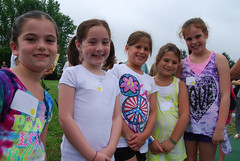 assumptions can be challenged, and where diverse people find ways to celebrate community and appreciate each other. One great thing about camp is that for a few weeks, the world grows a little smaller and everyone listens to the same soundtrack. In a fast-paced and interconnected world, camp “sounds” like the perfect place for connecting with others and as Hadley says, every summer adds up to “good times for campers and staff.” It’s often only later that campers realize how much the experience has shaped them and the way they see the world–much like how hit songs can illuminate the past in retrospect. The music (and fashions) may change through the years, but the core camp experience never goes out of date.
assumptions can be challenged, and where diverse people find ways to celebrate community and appreciate each other. One great thing about camp is that for a few weeks, the world grows a little smaller and everyone listens to the same soundtrack. In a fast-paced and interconnected world, camp “sounds” like the perfect place for connecting with others and as Hadley says, every summer adds up to “good times for campers and staff.” It’s often only later that campers realize how much the experience has shaped them and the way they see the world–much like how hit songs can illuminate the past in retrospect. The music (and fashions) may change through the years, but the core camp experience never goes out of date.
We’d love to hear about how your time at camp contributed to your understanding about others as well as what you’re looking forward to most this summer!
Thanks for the image Cre8iveDoodles ~*~ New Beginnings!



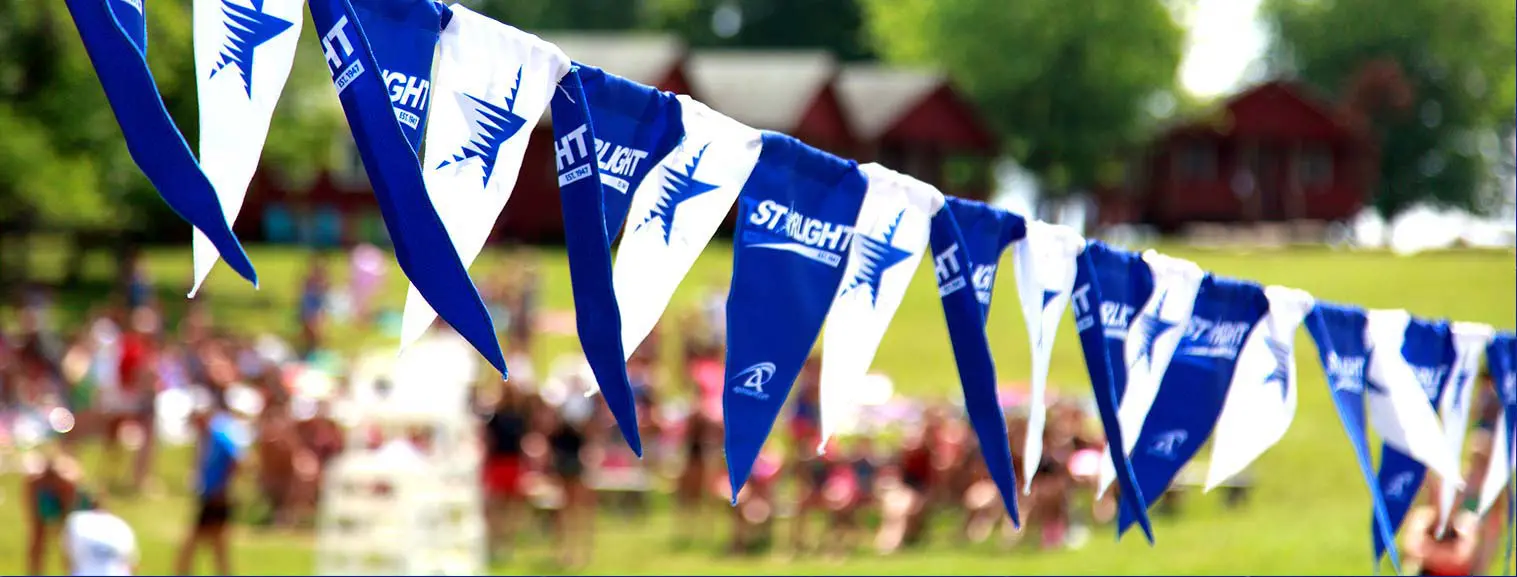
 Whether your Holiday Season has ended or is about to begin, summer camp season isn’t far away! In fact, on December 8th 2010, next year’s campers wore their camp shirts in numerous cities to mark the 200 Day Countdown To Summer. If you’ve never gone to camp, it may be difficult to understand what drives this passion for camp all year—but campers know that camp is contagious, FUN, and essential! The camp experience helps children develop into well-rounded adults in enormous and complex ways, and that’s really important—but having FUN and intense youthful experiences is how it all happens. That’s the brilliant combination of camp. The experience includes serious AND hilarious moments—often simultaneously! The whole experience is much like the two sides of a single coin, or the double-faced image of Janus, the Roman god who can see into the past and future at the same time—and the origin of the name for the first month—January.
Whether your Holiday Season has ended or is about to begin, summer camp season isn’t far away! In fact, on December 8th 2010, next year’s campers wore their camp shirts in numerous cities to mark the 200 Day Countdown To Summer. If you’ve never gone to camp, it may be difficult to understand what drives this passion for camp all year—but campers know that camp is contagious, FUN, and essential! The camp experience helps children develop into well-rounded adults in enormous and complex ways, and that’s really important—but having FUN and intense youthful experiences is how it all happens. That’s the brilliant combination of camp. The experience includes serious AND hilarious moments—often simultaneously! The whole experience is much like the two sides of a single coin, or the double-faced image of Janus, the Roman god who can see into the past and future at the same time—and the origin of the name for the first month—January. The serious side of camp includes feeling part of a unique community, identity development and participating through the years to make irreplaceable memories. If you don’t understand why camp is such an important American institution, in 1998 Ira Glass and the This American Life radio program attempted to investigate the topic—
The serious side of camp includes feeling part of a unique community, identity development and participating through the years to make irreplaceable memories. If you don’t understand why camp is such an important American institution, in 1998 Ira Glass and the This American Life radio program attempted to investigate the topic— It also highlights how fun, tradition, stories, community and being human are all part of identity development at camp. With his signature quirky style, Ira assembled more “truth is stranger than fiction tales,” where real campers tell stories of camp in days gone by and explain why the camp experience is so special. Hundreds of campers responded to his call for stories and the program shares a selection, so if you’re interested in history and interpreting American culture, you’ll find the reminiscences fascinating. Just remember that all camp experiences are not like the stories told—the point of the program is to illustrate the intensity of the experience! It ends with campers talking about becoming camp alumni and how their camp experiences won’t ever be forgotten.
It also highlights how fun, tradition, stories, community and being human are all part of identity development at camp. With his signature quirky style, Ira assembled more “truth is stranger than fiction tales,” where real campers tell stories of camp in days gone by and explain why the camp experience is so special. Hundreds of campers responded to his call for stories and the program shares a selection, so if you’re interested in history and interpreting American culture, you’ll find the reminiscences fascinating. Just remember that all camp experiences are not like the stories told—the point of the program is to illustrate the intensity of the experience! It ends with campers talking about becoming camp alumni and how their camp experiences won’t ever be forgotten. As we all know, time passes and our camp years are limited by the fact that we’re only children once. It’s easy to feel briefly melancholy at year’s end as time waits for no one, but of course, December also means that the promise of a new year is around the corner! In January, we’d like to continue looking backwards and forwards while thinking about camp and we’d especially love to hear from camp alumni. What’s the funniest thing that happened to you at camp? How did camp contribute to your adult life? We’d like to hear about the memories you hold dear and close to your heart, or what you wish for campers next year? If you’re counting the days until camp starts, what are YOU planning?
As we all know, time passes and our camp years are limited by the fact that we’re only children once. It’s easy to feel briefly melancholy at year’s end as time waits for no one, but of course, December also means that the promise of a new year is around the corner! In January, we’d like to continue looking backwards and forwards while thinking about camp and we’d especially love to hear from camp alumni. What’s the funniest thing that happened to you at camp? How did camp contribute to your adult life? We’d like to hear about the memories you hold dear and close to your heart, or what you wish for campers next year? If you’re counting the days until camp starts, what are YOU planning?
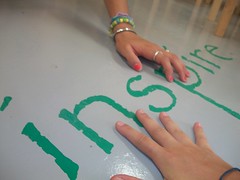 As parents, we are always on the lookout for experiences that help our children learn new skills. We enroll them in music lessons, martial arts, sports, theatre, choir and, of course, summer camps. But we all know that the best programs (and the best educational experiences) are ones that go beyond the basics of teaching skills to help develop our children’s character. The basics of
As parents, we are always on the lookout for experiences that help our children learn new skills. We enroll them in music lessons, martial arts, sports, theatre, choir and, of course, summer camps. But we all know that the best programs (and the best educational experiences) are ones that go beyond the basics of teaching skills to help develop our children’s character. The basics of 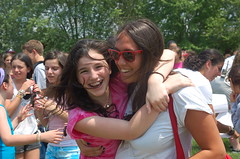
 “I felt like they were living a free life,” she says. The rules were there, just not stressful. This kind of independence creates the necessary space for the foundations of character to blossom. “I could not believe the person he had become – just a new person – totally confident in himself,” she says.
“I felt like they were living a free life,” she says. The rules were there, just not stressful. This kind of independence creates the necessary space for the foundations of character to blossom. “I could not believe the person he had become – just a new person – totally confident in himself,” she says.
